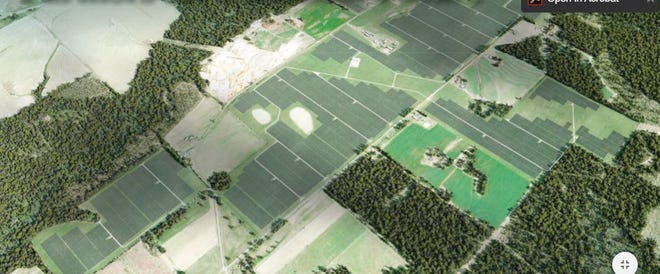DeFUNIAK SPRINGS — Attorneys for Gulf Power and the Walton County Board of County Commissioners are working toward some resolution of the utility’s legal challenge to a December commission decision to prohibit construction of a solar power generation facility on almost 900 acres in the north county.
In a May filing in Walton County Circuit Court, the county’s land-use attorney Steven K. Hall notified Judge Jeffrey E. Lewis that Gulf Power and the county “are currently exploring opportunities for resolution of the matters raised” in a petition filed by the utility.
The filing, made May 10, asks for a 30-day extension for the county to file its response to the petition. Under that timeline, the response would be in a matter of days, absent any other related filings in the case in the intervening time.
Previously:Walton County planners recommend denial of development density proposal
The latest:Gulf Power challenging Walton County decision against solar power facility plan
In the petition, filed on Feb. 26, Gulf Power seeks a court review of the commission’s 3-2 decision last Dec. 22 — a decision subsequently ratified at a Jan. 26 commission meeting — to deny Gulf Power’s application for a development order for an 868-acre tract between and around Harrison Road and Brown Road.
In connection with the request for a judicial review of the County commission’s decision, Gulf Power is asking that the decision be voided and the issue be sent back to the commission for consideration in light of any new judicial determination on the decision not to issue a development order for the project.
In a March 15 order giving the county 60 days to respond to the Gulf Power filing — that deadline now apparently extended by mutual agreement — Lewis notes that the court can only grant or deny the petition for review of the commission decision.
The court, Lewis noted, “may not enter any judgment on the merits of the underlying controversy or direct the lower tribunal (the County Commission) to any particular order (such as the decision to deny the development order).”
Also in the ruling, Lewis wrote that the court’s role is limited to determining whether due process and the essential requirements of law were met at the commission meeting, and whether the commission’s decision is “supported by competent substantial evidence.”
At both the Dec. 22 and Jan. 26 commission meetings, Commissioners Danny Glidewell, William “Boots” McCormick and Mike Barker voted against the development order. Commissioners Trey Nick and Tony Anderson were in favor.
The tract, three miles east of U.S. Highway 331 at State Road 2A, had been proposed as the site of a 74.5-megawatt solar power generation facility to be known as the Chautauqua Solar Energy Center. A megawatt of electricity is enough to power the average family home for a little more than a month.
The solar facility, the first such one proposed for Walton County, was set to be part of an ongoing Gulf Power effort in conjunction with Florida Power and Light to install 30 million solar panels across Florida by 2030.
Opposition to the proposed Chautauqua Solar Energy Center among the commissioners at the Dec. 22 meeting centered on whether it could be properly considered an agricultural use, as required for the tract in question, under the county’s comprehensive land use plan and its land development code. One of the related issues raised was the contention that the solar facility could occupy only 30% of the proposed site under the county’s agricultural use regulations.
Opposition also centered on concerns that the solar energy facility would adversely affect property values and quality of life for nearby property owners and residents.
More:Cattle farmer who opposed Walton solar farm persuades county to protect agricultural land
In deciding that solar generation facilities were outside of the plan and the code, the slim commission majority went against Walton County Planning Director Mac Carpenter, who told commissioners that the solar facility complied with both documents. The commission’s decision also rejected the position of Destin attorney Dana Matthews, representing Gulf Power, who maintained that the solar facility was an allowable use under county regulations.
In other developments in the case, Lewis in April rejected a motion from Herman Walker, the owner of the 868-acre tract contemplated for the solar facility, to file an “amicus curiae” (friend of the court) brief in the case.

In a motion filed five days prior to Lewis’ ruling, Walker’s attorney, Kenneth G. Oertel of Tallahassee, wrote that Walker could assist the court in addressing the commission decision on the development order “by addressing how Walton County’s decision personally affects him, the owner of the property which is the subject of Walton County’s decision, and how Walton County’s decision sets a precedent which would affect all similar property owners in Walton County, in a negative manner.”
Clay Adkinson, the county’s interim counsel, objected to Walker’s motion in a filing that contended Walker’s assertions of the wide-ranging nature of the Gulf Power case “belie his true motivation to look out for his own personal gain.” Adkinson also noted to Walker’s motion that it is “painfully obvious that (Walker) desires to participate in this case to benefit himself solely.”
In rejecting Walker’s motion, Lewis wrote that Walker was improperly seeking to argue facts in a case in which he is not a party, and also was raising issues not raised by either the county or Gulf Power.
“Therefore, the Court determines an amicus brief would not assist the court in this case … ,” Lewis wrote.
